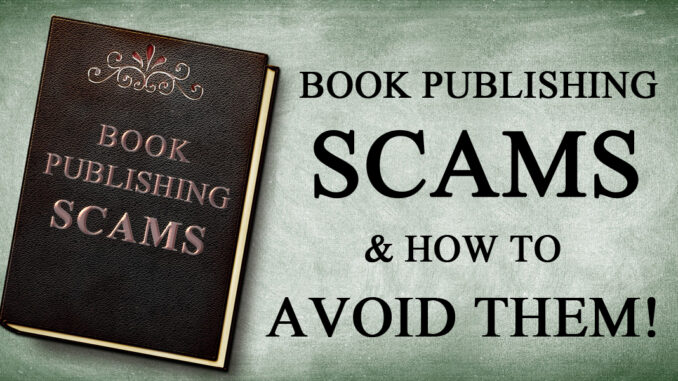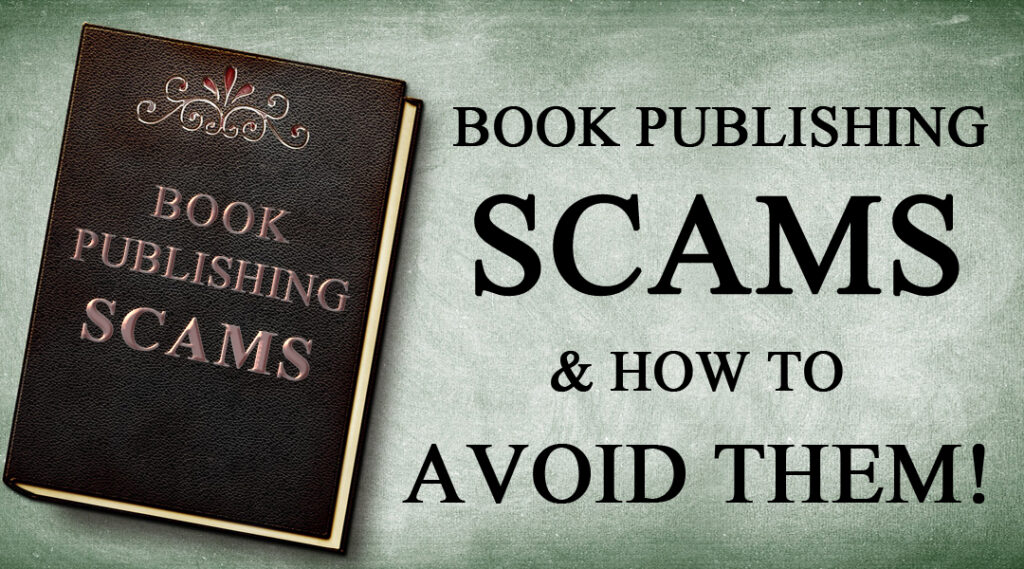
Book Publishing Scams and how they came to be.
Book Publishing Scams have become prevalent in today’s society and have gotten worse since Covid. So many people were stuck at home, some not earning any money, wracking their brain for a stay-at-home income opportunity. Others watching their child do tele-video classes, and realized, they could write a children’s book that’s better than what is out there.
Add to that, a mindset, that they think; if you have a published book, you’ll be an overnight success. You have visions of adoring fans lining up around the block to get an autograph from you and you are traveling the country (or world) doing signings.
On top of that, your social media feeds were being inundated by all of those videos from people claiming they’re making thousands of dollars a month selling their book and you can do it to – and you have lined up the problem in today’s industry.
What are Book Publishing Scams
Book publishing scams are fraudulent schemes that prey on writers or aspiring authors wanting to publish (or market) their work. Some of the common book publishing scams include:
- Vanity publishers that charge authors exorbitant fees for low-quality services and no marketing support.
- Fake publishers that impersonate reputable publishers and offer fake contracts and royalties.
- Marketing companies that use names of respected publishing professionals to lure authors into paying for ineffective or nonexistent services.
- Screenplay scams charging thousands to write your book into a screenplay but does absolutely zero to get your book made into a movie.
- Fake literary agents wanting to sell you services to gain better exposure for your book or worse yet, taking the PDF of your book when you email it to them, and republishing it in another country so they get the royalties.
- The list goes on and on.
Whether you are a new author just trying to find a way to get your book published, or you chose to self-publish and are now seeking marketing options to get sales, there is definitely a scam for you.
How to spot Book Publishing Scams
Copyright Scams
One of the first things a good author wants to do after writing their masterpiece is to have it copyrighted. If you go anywhere besides copyright.gov you are being scammed. I have met authors who paid hundreds for a copyright and they received a bill a year later to renew. They prey on the uneducated.
Once you have copyrighted your book, your are now on a list that predators can purchase and email you for publishing and marketing services. If they contact you directly, and you did not solicit their services, it is likely a scam. If they are contacting you about an older book, it is because they bought an older mailing list. It is not because the book caught their attention.
Email Scams
- Check the From email address. If it’s Gmail it’s a scam. Reputable publishing companies use a company domain email address, but even that is not fool-proof.
- Check the grammar. If it’s bad it’s a scam.
- If they say Dear or Greeting without using your name, it’s a bulk scam (meaning they sent out a generic message to thousands).
- If they mention how great your book is, but not specifically the book title, it’s a bulk scam.
- If they are contacting you about a specific book that has been out for a while and is not doing well, it’s a scam.
- They’re contacting you out of the blue, and you haven’t sent them a query letter, it’s a scam.
- If you have multiple books out and they can’t tell you which one grabbed their attention, it’s a scam.
Website Scams
- If the email is a domain name, (a company name after the @) type it into a search with the word scam or review next to it to see what others say about the company.
- If the email address is a domain name, check their website. If there are images that look like they should be clicked on but can’t be, or they look low resolution or grainy, they are spoofing a website. I’ve seen medium size publishing companies fail, let go of their domain name which gets bought cheap and a spoof website designed on it overnight.
- Go to the website who.is and type the domain name into the search. If the website has only been live for a short period of time – run.
Literary Agent Scams
- If a literary agent is asking for money it’s a scam. They only get paid when a traditional publisher signs a contract with you and they get a percentage of your advance.
- If it is a literary agent you didn’t contact first, it’s likely a scam. Real agents are inundated by unsolicited submissions, they don’t have time to seek books already published because no traditional publisher will pay for the rights of your book and republish it unless it has sold millions.
- Unless your book is selling thousands, your book will not be on anyone’s radar.
Marketing Scams
- Cold calls out of the blue, where after you answer, it takes a few seconds for the person to connect to the call and respond, and you hear a lot of chattering in the background, it’s a scam. Literary Agents, Traditional publishers do not retain calling centers.
- If they call you and say your book could do better and start offering marketing services, that is likely a scam. They are just trying to sell you services at an exorbitant price. You can hire your own website designer, write your own press releases and distribute them through PR sites. You can have somebody create your own book trailer. And you can do your own Google, Facebook, Amazon ads. You do not need to hire somebody to do all of that for you, it’s still going to cost you money, but you can cut out the middleman.
Awards and Contest Scams
I hesitate writing this section because I, personally, like to win contests and get book awards. I’m somewhat choosy which contests I enter, but mostly, I do it just for me. I like it when I receive a good review, an award for my wall, stickers I can showcase on my book and the ability to say I am an award-winning author, so how do you decide which contests are legit?
- Legitimate contests have very few winners which are usually traditionally published and you don’t have a chance to win. I may be bias but it seems very much like a popularity contest and who has the most money backing them.
- Some contests are middle of the road scams, meaning there are few entries or a lot of winners, or a ton of categories, so you win against few. It’s still a win, just not as prevalent and Earth-shattering.
- Other contests are really bad scams, where everyone wins, you get no marketing or exposure, you pay for your stickers or their marketing.
- They offer to put your poem or short story in a compilation that they sell and reap the royalties for, or sell dozens of copies to all of the authors and their families at cost and that’s it.
- They charge hundreds to enter with nothing to show for your win, or they charge nothing to enter but hundreds to sell you digital seals.
Check the website on who.is. If it is new and yet they are claiming to be the best contest in the world? See how many winners there are every year, quarter or month. If they share winners on social media how many likes, comments and followers are there?
Guaranteed Sales Scams
Absolutely no one can guarantee legitimate sales. You can pay for Amazon, Google or Facebook ads, get to the top of the search results but still, you can’t be guaranteed sales.
Anybody who suggests that they can guarantee you sales, are either lying, or are charging you an exorbitant amount of money to purchase a bunch of your books. That does not mean that those are sales from actual readers who will one day become fans.
One last thought
If you want to be traditionally published, it will cost you no money out of pocket. If you are going to self-publish, do it yourself. If you need help self-publishing, then that is when you hire somebody to help you. Self-publishing a book requires an interior PDF file and a cover PDF file. Hire someone to help you create both of those professionally, then upload them to your own KDP account. It is not a scam if you contact them. It is, if they are charging an exorbitant amount of money to do that task though!
The only reason why a traditional publishing company would be interested in your book after you have self-published it is if it is doing incredibly well, has thousands of reviews and purchases, and if that’s the case… Why would you want them to republish it and buy the rights to your story? This is a philosophical question you would want to answer yourself.
This industry is very dirty, and you have to find somebody that you can trust to work with. We work with Kathleen’s Graphics. She is website and graphic designer. She can create your professional book cover. Do interior text flow and graphics that will make your book pages pop. Design you an author website and branding that should be used on all social media profiles. Produce book trailer videos, and as an author, help guide you along the way while educating you about common and recent scams.

